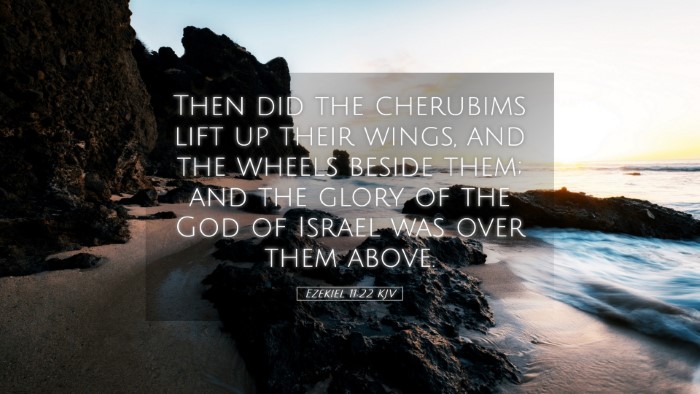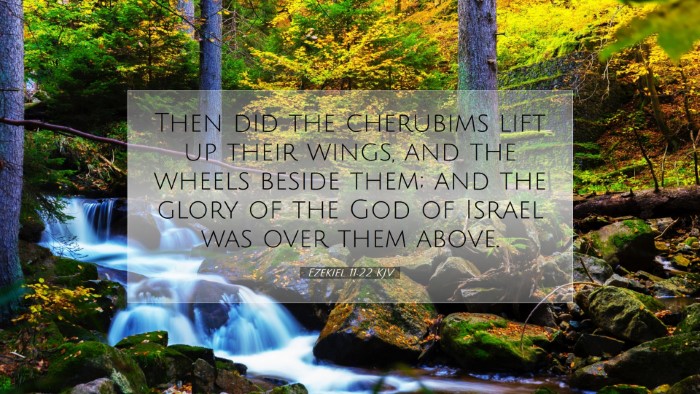Ezekiel 11:22 - Commentary and Insights
Text of the Verse: "Then did the cherubims lift up their wings, and the wheels beside them; and the glory of the God of Israel was over them above."
Overview
This passage occurs within the prophetic vision of Ezekiel, where the prophet experiences profound revelations regarding the judgment and restoration of Israel. The imagery of cherubim, wheels, and the divine glory encompasses the theology of God’s omnipresence and His providential care over His people, even in exile.
Exegetical Analysis
Literary Context
The book of Ezekiel is characterized by its vivid apocalyptic imagery and its theological themes of judgment and restoration. This verse constitutes a pivotal moment in Ezekiel’s vision, emphasizing the departure and eventual return of God’s glory.
Historical Context
During Ezekiel's ministry, the Israelites were in Babylonian captivity as a consequence of their collective unfaithfulness. This passage underscores the theological implications of God's glory departing from Jerusalem and hints at the possibility of divine restoration. As noted by Albert Barnes, this reflects God’s judgment, wherein His glory is withdrawn when His people rebel against Him.
Commentary Insights
-
Matthew Henry:
Henry emphasizes the significance of the cherubim, which symbolize divine presence and guardianship. He posits that their movement alongside the wheels indicates how God's providence actively engages with both heavenly and earthly realms in guiding His people.
-
Albert Barnes:
Barnes interprets the lifting of wings and the movement of the wheels not merely as a physical action but as a profound statement of God's readiness to act on behalf of His people. It signifies both a judgment over sin and a promise of future restoration, as the same glory will return after cleansing and repentance.
-
Adam Clarke:
Clarke draws attention to the wheels, representing God's omnipresence, indicating that God is not confined to one location but is aware of every situation. He notes that the position of the glory above the cherubim serves as a reminder of God’s sovereignty and fundamental authority over creation.
Theological Implications
The movement of the cherubim and the wheels, combined with the presence of God’s glory, raises profound theological themes relevant to today’s believers:
- Divine Presence: Despite the apparent distance resulting from exile, God's presence remains vigilant and active on behalf of His people. This encourages believers that, even during spiritual desolation, God remains near.
- Divine Sovereignty: The imagery illustrates God's absolute control over all cosmic and earthly events, affirming that no matter the situation, God's will ultimately prevails.
- Hope and Restoration: As the glory departs, the promise of its return encapsulates the hope of restoration through repentance. This theme reverberates through the New Testament, where Christ fulfills the promise of God's presence among His people.
Applications for Ministry and Study
For pastors, theologians, and students, Ezekiel 11:22 offers rich theological and practical applications:
-
Encouragement in Exile:
Recognize that even in seasons of personal or corporate "exile," God’s glory is still accessible through worship and repentance. This can be a source of hope in preaching and counseling.
-
Understanding God’s Character:
Explore the nature of God’s presence remaining amongst His people. Develop teachings around God’s desire for relationship despite human failures, focusing on His grace and mercy.
-
Promoting Repentance:
Reflect on the necessity of repentance and obedience in the life of the believer, understanding it as a pathway to experiencing God's glory and favor. This is crucial for preaching and teaching within the church community.
Conclusion
Ezekiel 11:22 stands as a significant passage illustrating the interplay between divine judgment and mercy. It calls the believer to recognize God's eternal presence and sovereignty while encouraging a posture of repentance and faith. As we reflect on this text, may we find assurance in God’s abiding presence, even amid turbulent times.


